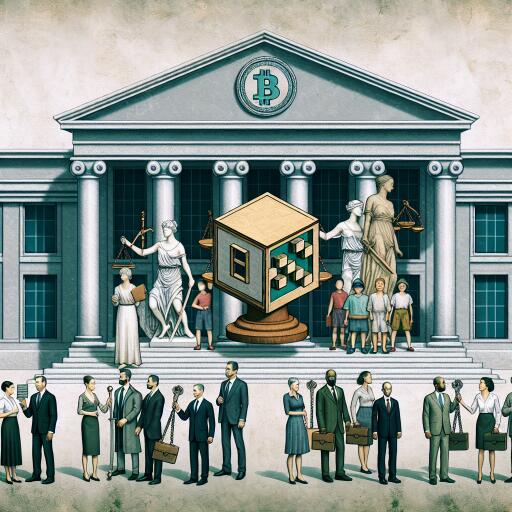Blockchain and Financial Markets: A Critical Examination
As the financial world continues to explore the potential of blockchain technology, major Wall Street entities, including investment powerhouses like JPMorgan and the globe’s largest asset manager, BlackRock, are advocating for the tokenization of assets. This innovative process involves transforming various assets, such as stocks, bonds, art, and real estate, into digital tokens on a blockchain, promising to streamline and automate the current processes in financial markets, which are often seen as inefficient and prone to errors.
Yet, despite the burgeoning interest and the apparent momentum behind these technological advancements, not everyone is convinced of blockchain’s suitability for the financial markets. Offering a critical perspective, Hilary Allen, a finance academic and law professor at the American University Washington College of Law, presented a thought-provoking viewpoint to Congress, challenging the prevailing narrative surrounding blockchain’s potential impact on financial markets.
The Argument Against Blockchain for Financial Assets
Speaking at a hearing convened by the House’s Subcommittee on Digital Assets, Financial Technology and Inclusion, Professor Allen argued that the perceived benefits of tokenization do not necessarily require blockchain technology. She highlighted the fundamental inefficiencies and operational vulnerabilities innate to blockchain technology that, in her view, render it unsuitable as a foundational infrastructure for real-world assets.
Allen pointed out the inherent limitations of blockchain’s consensus mechanisms, which are the protocols used to achieve agreement among the network’s nodes for verifying transactions. These mechanisms, she argued, are not only resource-intensive but are purposefully designed with inherent delays, compromising their ability to process transactions efficiently and at scale.
Moreover, the governance of blockchains poses significant challenges. In contrast to the centralized databases that underpin the world’s financial markets, blockchains are often managed by unregulated and sometimes anonymous developers, raising concerns over cybersecurity and operational risk management.
Allen’s critique extended to financial firms’ endeavors to resolve blockchain’s scalability and governance issues, which often involve re-centralizing control over certain processes. This approach leads to a critical question: why utilize public, permissionless blockchains at all if the solutions entail reverting to centralized control mechanisms?
Tokenization and Financial Inclusion: A Skeptical View
The promise of democratizing finance through tokenization and providing fractional ownership of traditionally inaccessible assets has been a key selling point for blockchain proponents. However, Allen urges a more cautious interpretation. She highlights the reality that many Americans are living paycheck to paycheck, suggesting that the barrier to financial inclusion is not necessarily the lack of investment opportunities but rather the absence of disposable income to invest.
Divergent Opinions and Calls for Regulatory Adaptation
Despite Allen’s skepticism, other voices at the congressional hearing painted a more optimistic picture of tokenization. Representatives from companies actively involved in managing tokenized securities underscored the potential benefits of this technology and called for regulatory adaptations to facilitate its growth.
For instance, Carlos Domingo, co-founder and CEO of Securitize, advocated for legal and regulatory reforms to better accommodate blockchain innovations. Securitize, playing a significant role in BlackRock’s tokenized fund BUIDL, highlights the need for adjustments in the Securities and Exchange Commission’s (SEC) licensing framework to enable brokers to securely manage digital assets. Domingo outlined the challenges faced under the current regulatory regime, describing it as overly restrictive and unclear regarding the eligibility of tokenized securities.
Conclusion
The intersection of blockchain technology and financial markets is a hotbed of debate and innovation. While the potential for efficiencies and new opportunities is undeniable, critical voices like Professor Hilary Allen’s offer important cautionary perspectives on the rush towards widespread adoption of blockchain for financial assets. As the dialogue between technological innovation and regulatory evolution continues, the path forward promises to be both challenging and intriguing.
